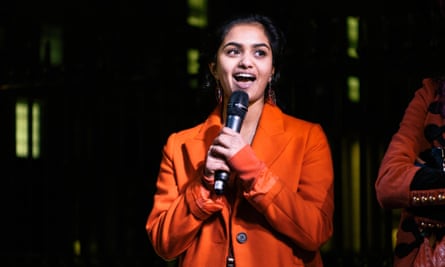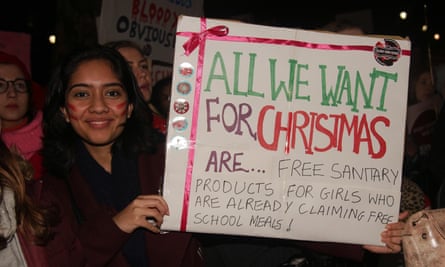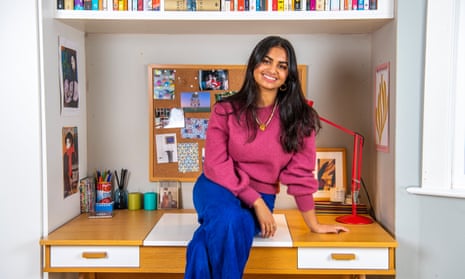Amika George, 22, didn’t set out to be an activist. “None of my immediate family were involved in formal politics in any way,” she says. And yet, while still a teenager, she ran the successful Free Periods campaign that led to free sanitary products being placed in schools and now she has a book, Make It Happen, about how to get involved in politics from the grassroots.
Featuring prominent voices from Arundhati Roy to the Egyptian writer and radical Wael Ghomin, its worldview is that there is an infinite possibility for change, situated in the hands of every one of us. In other words, it is a remix of Hannah Arendt with a sunnier chorus. So I am surprised when I speak to her, not just by her hinterland but by her manner. I was expecting a punchy, studs-first Marxist; instead I find a quietly spoken, very thoughtful committed Christian, who is constantly challenging, often playful but always with serious intent.
George was just 17 when she read a headline on the BBC website: “Girls Too Poor to Buy Sanitary Products Missing School”. She had read an article about period poverty in India, and what now caught her eye was that one charity was diverting products that it had intended to send to Kenya to the UK. Students in the UK, it seemed, were facing the same problems as those in the developing world. That was 14 March, 2017; by April, she had set up Free Periods, to campaign against period poverty. She promoted her cause diligently: from the obvious (a petition on change.org) to the festive (a demonstration in Parliament Square just before Christmas 2017. “Even though everyone was protesting period poverty – something so horrendous – it was also a celebration of periods”, she says).
A collaboration with the Red Box Project, founded around the same time with similar aims, led to a legal campaign against the UK government, urging it to comply with its obligations to “ensure equal access to education for all children, irrespective of their sex”. Two months after that, in January 2020, the Department for Education committed funding for free period products in all English schools (similar commitments had already been made in Scotland, Wales and Northern Ireland). “Free Periods was successful,” she concludes simply. “That took two and a half years. I started my campaign before I could even vote, and I think that’s a testament to the fact that, actually, you can achieve change as somebody who is not represented in politics.”
Were her parents (her mother works in financial services and her father is a project manager) surprised by her campaign? Only moderately; she had always been fiercely independent. Her school friends must, surely, have thought her single-mindedness extreme? “I don’t think so. Not unless they were saying that behind my back!”

Just because the battle was won in such a short time, however, it doesn’t mean it was easy. The levers of democratic change started off remote and unresponsive. George recalls being at school, learning about the Houses of Parliament, then going off to a meeting in the Commons the same day, and “having a meeting with an MP who was quite resistant to listening”. It is an arduous life lesson, that parliamentary representatives don’t start paying attention until they absolutely have to. Then, there were flat, uneventful times when nothing seemed to work, and only social media was keeping her ambitions afloat (“floods of DMs and emails and tweets from people who were incredibly supportive”).
George initially fell foul of other campaigners, too, changing the language she used after “I had conversations with trans men or nonbinary people who felt excluded.” But switching to “students” or “children” led to criticism from some feminists who insist the words “girl” and “woman” should not be discarded. On this, though, she is relaxed. “I didn’t have to reevaluate the aims of my campaign or what I was asking the government to do,” she says. “It just meant that I was making people feel included. What I find upsetting is that the people who were already included see that as an affront.”
At the start of her campaign, she was shocked at just how horrible keyboard warriors could be. “I went to an all girls’ school: everybody was quite open in talking about periods, I hadn’t been touched by the stigma. It never occurred to me that people might not like any mention of periods. That there was this disgusting blame culture, either denying the existence of period poverty or saying: ‘The parents are clearly just spending all their money on cigarettes or alcohol.’”
She says she turned that “dismissive attitude” into “campaigning energy”. which is an incredible, yet somehow believable, skill: she is aware of prejudice or bigotry, yet never sounds like she is taking it seriously.
All the while, she was becoming a poster girl for youth activism, being named on the Time Most Influential Teens of 2018 list, the Big Issue Top 100 Changemakers and Teen Vogue’s 21 under 21 list. But, rather than basking in this celebration of her work, she questioned it. “On the news, you always see one face. On climate change, it’s always Greta Thunberg. I think she’s incredible, but I think it’s very indicative of how the media approaches young people and politics. They don’t see those two things as a natural fit, they have to pin it on one person. Suddenly it’s: ‘There’s this one teenager that actually understands politics.’ You’re heralded. As great as that can feel, it’s also really dangerous. If you have no experience in politics or activism, you think you have to be at that level of confidence or resource or privilege before you can be involved in the conversation.”
Yet the plaudits kept coming. George was awarded the Goalkeepers Campaigners award from the Bill & Melinda Gates Foundation, and made connections and inroads at the UN. Then, last year, she became the youngest person to receive an MBE, while she was still at Cambridge. This, however, was a double-edged sword – since it was only when she started her history degree that she got to grips with the details of empire. Then she wasn’t sure she wanted to be a Member of its Order. (George was born in London; her grandparents moved to the UK from Kerala in the 1970s.) “Literally, I got to university before I even understood the true atrocities of what the British did in India, which is where a lot of my extended family still lives. Something like the Amritsar massacre, it should be British history, but I heard nothing about it. I was taught Henry VIII’s wives about six or seven times.”
She accepted the MBE all the same, on pragmatic grounds; her campaign comes first, and the award opens doors. She had served enough time hitting brick walls. For her dissertation, George focused not on empire but on “British Asian teenagers in London in the 90s – how they wove their political identities into music and TV and clubbing; also how music was a really important tool in building up the anti-apartheid movement”.
It is a bit bracing, to discover that people can now study the 90s as part of a history degree. But it is also quite typical of George’s approach: studious but always relevant, practical. She is taking a gap year, then wants to do a masters on Kerala, “the only democratically elected Marxist government in the world. I’m really interested in how that’s been sustained, particularly given that India’s national government is, obviously, so rightwing.”
She is also keen that the university doesn’t rest on its laurels when it comes to diversity. “There’s a big conversation happening at universities like Cambridge around access, around the private and state school divide. But I don’t think people are differentiating between grammar and comprehensive schools. Grammar schools, schools like mine, are overrepresented, which is still replicating privilege. But to a person from a private school, they don’t differentiate. They just think: ‘They’re all free.’”

In political terms, she is clear about where she doesn’t want to go next: formal politics. And she doesn’t want to start another, different campaign. Instead she wants to slot into something that already exists. Climate change is one focus, and part of her reason for writing Make It Happen was the strong sense of anxiety in her generation. “It feels like a completely insurmountable thing for one teenager to tackle. That’s why I talk about breaking it down to a community level, fitting it into a larger framework of issues, connecting with people who are working on similar things.”
One criticism that vexes her is that is the claim that even the act of breaking poverty down into types – period poverty, fuel poverty, food poverty, child poverty – enables the discourse to step around poverty itself. “I find that dismissive, ridiculous,” she says. “When you have these micro campaigns, which are often asking for quite tangible actions, you get a lot of energy.” Personally, I’m a bit sceptical of things like this, such as the Sustainable Development Goals, which always seem to be extremely good at diagnosing effects – a lack of clean water or education – but deliberately bad at diagnosing causes, which usually track back to exploitation. George gives that pretty short shrift as well: “I met so many activists through the global goals, and got a huge amount of support from people within the UN, people within the campaigning worlds, who were tying up all these threads into a bigger blueprint for change. Period poverty sits at the intersection of gender, of education and of health.”
She may orientate towards the possible, but that doesn’t mean she is not radical, or angry, or that she’s always optimistic. “Activism is important because you need to see success and when you look for success, it’s people doing things. You find your hope in people. But I hate to think that activism requires constant optimism.” She is pessimistic about the UK government, particularly the police bill moving through parliament. “I think it’s one of the most urgent issues in the country today. I don’t know if there’s the right level of awareness of just how damaging it is. Even going back to the Free Periods protest, that was the first time I got my head around just how many people wanted to give their support. Loads of MPs turned up as well. I realised I wasn’t alone, that it was actually a community effort. My mum wouldn’t have let me go if she thought I’d be arrested.”
It is ironic, too, she says, that many recent protests have been against structural racism, and the legislation this government is trying to pass hands more powers to the police, an institution accused of so much structural racism (“People of colour, particularly black people, are so overrepresented in stop-and-search”).
She considers quite carefully what kind of activist she is: certainly leftwing, definitely not trying to overthrow capitalism, or at least, not out loud. “I would say my views on gender, particularly,” and by this she means believing in gender equality, and LGBTQ+ inclusion, “would be considered extreme or radical, which is unfortunate. I don’t think they should be.” But, anyway, the shape of politics has changed, she says: activism doesn’t have to be all-consuming, you don’t have to identify as extreme. “Maybe it’s a generational difference,” she says, tactfully.
She brings these entirely unfamiliar traits to the world of direct politics: tact and respectability. From a distance, it seems a little too polite to make change, up close it is admirable, a bit humbling. I wouldn’t say it was key to her success, though; I think she would have succeeded anyway.
Make It Happen by Amika George is publishing in paperback with HQ, HarperCollins on 20th Jan 2022
